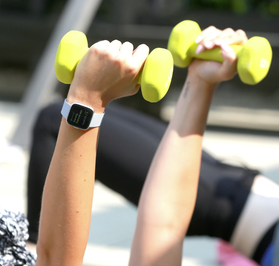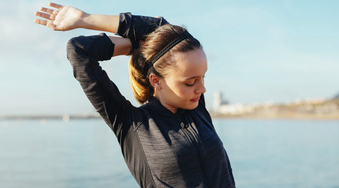Making Moves
An online physical activity program with 1:1 exercise physiologist support for childhood cancer survivors.
Young people affected by cancer may be at risk of developing chronic conditions such as obesity and cardiovascular disease. Engaging in regular exercise plays a crucial role in improving physical and mental health, enhancing quality of life, and reducing the risk of these long-term health challenges.
Despite the benefits of physical activity, research shows that 85% of childhood cancer survivors do not meet physical activity guidelines. Recognising this gap, our team have collaborated with survivors, parents, and healthcare professionals to design a tailored program.
'Making Moves' is an online physical activity program that educates childhood cancer survivors about health and physical activity after cancer.
Young people affected by cancer may be at risk of developing chronic conditions such as obesity and cardiovascular disease. Engaging in regular exercise plays a crucial role in improving physical and mental health, enhancing quality of life, and reducing the risk of these long-term health challenges.
Despite the benefits of physical activity, research shows that 85% of childhood cancer survivors do not meet physical activity guidelines. Recognising this gap, our team have collaborated with survivors, parents, and healthcare professionals to design a tailored program.
'Making Moves' is an online physical activity program that educates childhood cancer survivors about health and physical activity after cancer.
What does this study aim to achieve?
The overall objective of this study is to investigate how effective this program is for survivors and evaluate how we can implement this program in the real world.
- The primary aim is to improve survivors' physical activity self-efficacy (defined as the confidence to be physically active).
- The secondary aim is to improve survivors' physical activity levels, physical fitness, depressive symptoms, quality of life, and enjoyment of exercise.
|
WHAT IS INCLUDED IN THE PROGRAM?
Making Moves is an 8-week physical activity program designed by young survivors, parents, healthcare professionals, and researchers. It includes:
|
Would you like to be involved?
WHAT DOES PARTICIPATION INVOLVE?
- You will be asked to complete a short questionnaire which should take 10-15 minutes to complete.
- You will be asked to wear a research activity tracker for 5 consecutive days.
- You will then attend your first session with an AEP. In this consultation, you will discuss your physical activity levels, complete two short fitness tests, set goals, and can ask questions.
- During the 8-week program, you will have access to the online Making Moves modules, videos and exercise tips. You also have an optional session with the AEP.
- After 8 weeks, you will attend another session with the AEP and wear the research activity tracker for 5 days.
- 3- and 6-months later, you will have your fourth and last session with the AEP.
For more information, you can:
If you are a medical practitioner, nurse, or allied health professional, you can refer your patient here.
- Visit the Making Moves website: https://www.mmprogram.online/
- Read the Participant Information Sheet.
If you are a medical practitioner, nurse, or allied health professional, you can refer your patient here.
contact information

If you have any questions, please contact the Making Moves team.
Email: [email protected]
This research study is led by Dr Lauren Ha. Dr Ha is a Post-Doctoral Research Fellow and Accredited Exercise Physiologist.
Email: [email protected]
This study is proudly supported by The Kids' Cancer Project.
Email: [email protected]
This research study is led by Dr Lauren Ha. Dr Ha is a Post-Doctoral Research Fellow and Accredited Exercise Physiologist.
Email: [email protected]
This study is proudly supported by The Kids' Cancer Project.

